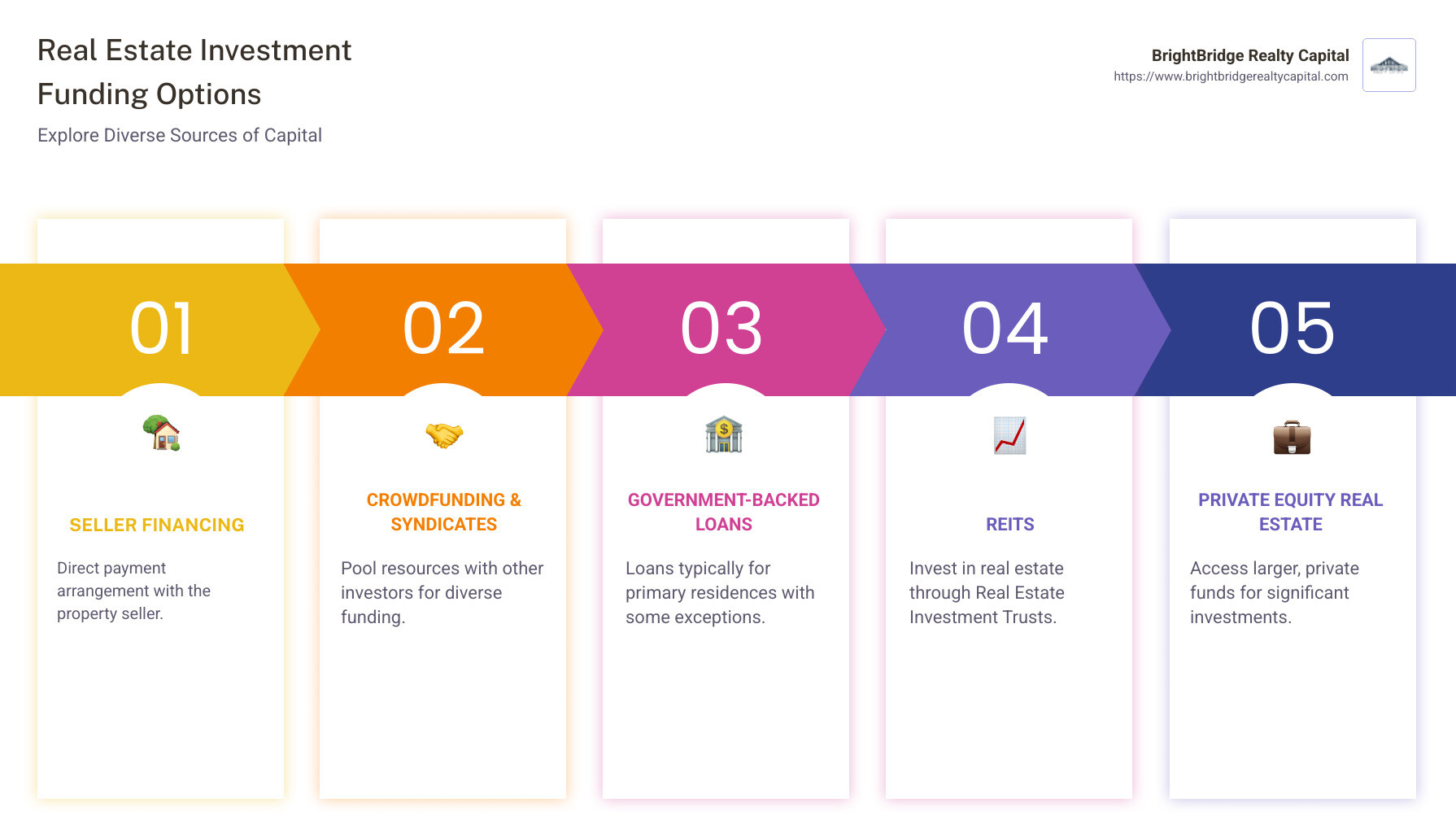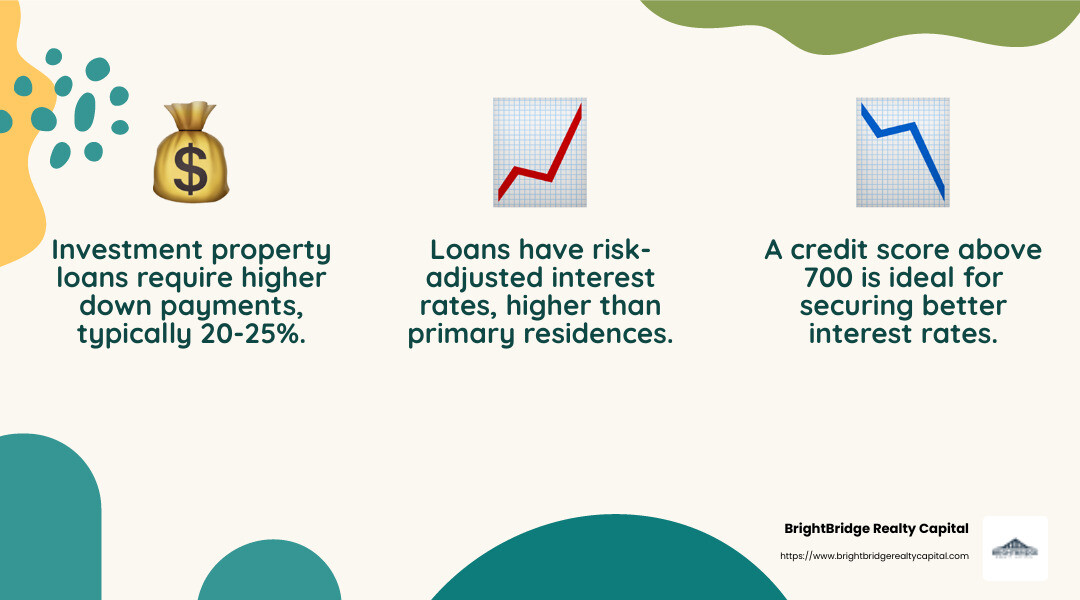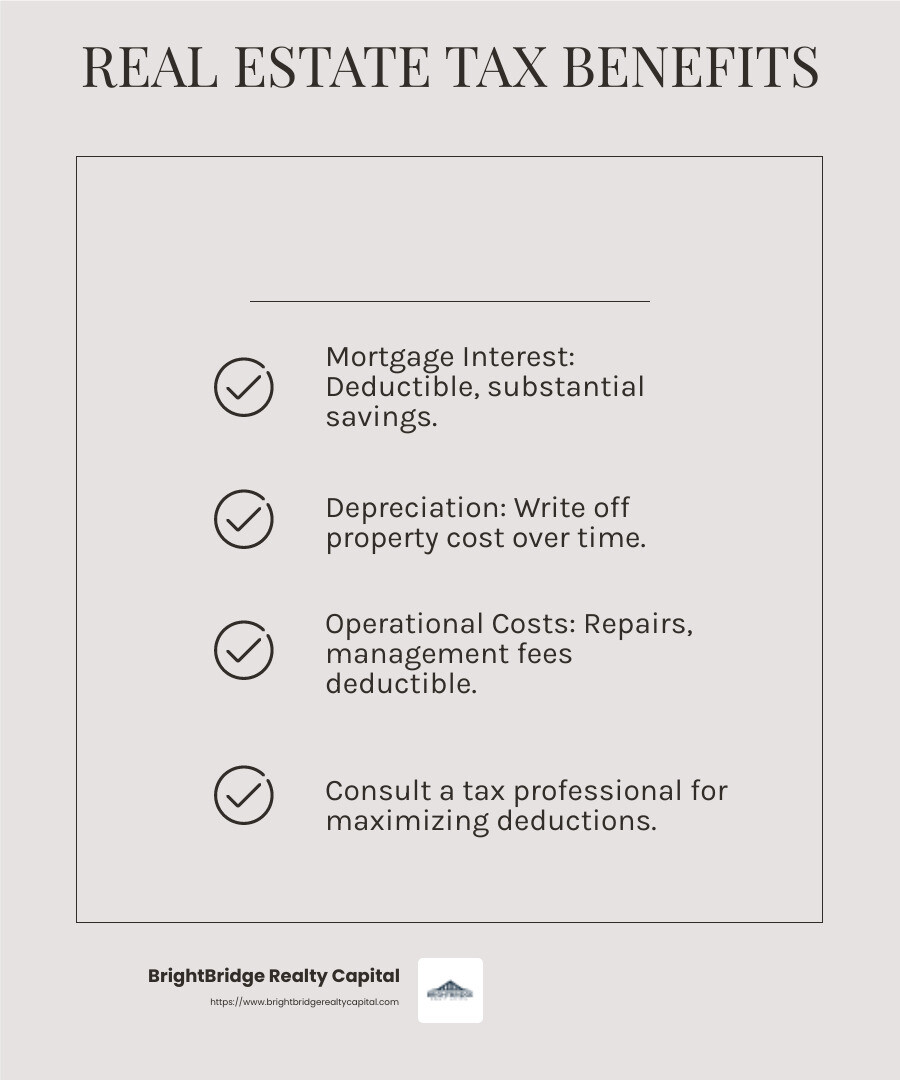Investing in Real Estate: How to Find the Right Funding

Real estate investors funding is crucial for anyone looking to seize opportunities in the competitive market of property investment. Whether you're fixing and flipping properties or expanding a rental portfolio, navigating the diverse landscape of funding options can be daunting. Here's a quick overview to get you started:
- Seller Financing: Direct payment arrangements with the seller.
- Crowdfunding and Syndicates: Pooling resources with other investors.
- Government-Backed Loans: Generally for primary residences, but there are exceptions.
Real estate investment offers numerous benefits such as diversification, steady cash flow, and tax advantages. But financing these investments can be complex. Investors face problems like higher down payments and stricter credit requirements. Choosing the right option is key to maximizing your returns while minimizing risks.

Real estate investors funding definitions:
Understanding Real Estate Investors Funding
When diving into real estate, understanding real estate investors funding is essential. Unlike primary home loans, investment property loans come with their own set of challenges. Here’s what you need to know:
Higher Down Payments
Real estate investment loans typically require higher down payments. This is because lenders see these loans as riskier than those for primary residences. Expect to put down at least 20% to 25% of the property's value. This larger upfront investment can be a hurdle, but it also means you’ll have more equity in the property from the start.
Stricter Credit Requirements
Lenders impose stricter credit requirements for investment properties. A higher credit score can help you secure better interest rates. Generally, a score above 700 is ideal. This is because lenders want to ensure that borrowers can manage the added risk of investment properties, which often come with variable income streams.
Risk-Adjusted Interest Rates
Investment loans often come with risk-adjusted interest rates. These rates are higher than those for primary residences to account for the increased risk. For instance, if the rental market dips, you might struggle to cover mortgage payments. Higher interest rates help protect lenders from these potential losses.

In summary, real estate investors funding involves navigating higher down payments, stricter credit requirements, and risk-adjusted interest rates. Understanding these elements can help you better prepare for your investment journey.
Next, we'll explore the Types of Real Estate Funding available to investors, including REITs, crowdfunding, and private equity real estate.
Types of Real Estate Funding
When it comes to funding real estate investments, there are several options to consider. Each type has its own benefits and considerations, so let's dive into three popular choices: REITs, real estate crowdfunding, and private equity real estate.
Real Estate Investment Trusts (REITs)
REITs offer a way to invest in real estate without directly buying properties. They work like mutual funds, allowing investors to pool their money to purchase shares in income-producing real estate. This includes properties like office buildings, shopping centers, and apartment complexes.
Benefits: REITs are traded like stocks, making them easy to buy and sell. They also pay out at least 90% of taxable income as dividends, providing regular income to investors.
Types: There are three main types: equity REITs (own and operate properties), mortgage REITs (provide loans or invest in mortgages), and hybrid REITs (a mix of both).
Real Estate Crowdfunding
Real estate crowdfunding has gained popularity since the passage of the 2012 JOBS Act. This method allows multiple investors to pool funds online to invest in real estate projects.
Accessibility: Crowdfunding platforms make it easy to start investing with smaller amounts, sometimes as low as $1,000. This opens the door for those who might not have large sums to invest.
Risks and Rewards: While it offers diversification, investors have less control over the projects. Returns depend on the success of the project, so there's potential for both profit and loss.
Private Equity Real Estate
Private equity real estate involves investing in private funds that buy and manage properties. These funds are typically reserved for accredited investors with a high net worth.
Long-Term Gains: Unlike REITs, private equity funds focus on property appreciation over time rather than immediate income. They may hold properties for several years before selling them for a profit.
High Barrier to Entry: These investments often require substantial capital and a long-term commitment. They're best suited for experienced investors looking to diversify their portfolios.
Each of these funding types provides unique opportunities and challenges. Whether you're seeking steady income or long-term growth, understanding these options can guide your investment decisions.
Next, we'll dig into how to secure real estate investors funding, including strategies like leveraging hard money lenders and using tools like PropStream.
How to Secure Real Estate Investors Funding
When you're diving into real estate investments, finding the right funding can be a game-changer. Let's explore some effective strategies: hard money lenders, PropStream, and leverage.
Hard Money Lenders
Hard money lenders can be a quick and flexible funding source for real estate investors. Unlike traditional bank loans, these loans come from private individuals or groups. This means fewer hoops to jump through and faster access to cash.
Pros: Fast approval and funding, ideal for time-sensitive deals or projects that traditional lenders might consider too risky.
Cons: Higher interest rates and shorter loan terms, usually requiring repayment within a year or two. Be prepared for a sizable down payment or personal collateral.
Tip: Use hard money loans for short-term projects like fix-and-flip properties where you can quickly repay the loan after selling the property.
PropStream
PropStream is a powerful tool for real estate investors. It provides data and analytics that can help you make informed decisions about where to invest.
Features: Access to property data, owner information, and market trends. It helps you identify potential deals and evaluate their viability.
Benefits: Streamlines the process of finding and analyzing properties, saving you time and effort. With PropStream, you can also generate leads and manage your deals more effectively.
Case Study: Many investors have used PropStream to find undervalued properties and secure profitable deals. It's especially valuable for those looking to invest in new or unfamiliar markets.
Leverage
Leverage is a key concept in real estate investing, allowing you to control a large asset with a relatively small amount of money. By borrowing funds to purchase a property, you can amplify your returns.
How It Works: Use a mortgage or loan to finance a property purchase. The goal is to achieve higher returns than the cost of the loan.
Risks: While leverage can increase profits, it also magnifies losses. It's crucial to assess the potential risks and ensure you have a solid plan for repayment.
Example: If you buy a rental property using leverage, the rental income can cover the mortgage payments, and any appreciation in value boosts your equity.
By utilizing these strategies, you can secure real estate investors funding and take advantage of lucrative investment opportunities. Next, we'll explore top strategies for beginners in real estate investing.
Top Strategies for Beginners
Starting in real estate investing can be exciting but also overwhelming. Here are some beginner-friendly strategies to help you get started:
Real Estate Investing for Beginners
Start Small and Learn: Begin with a single-family home or a small multi-unit property. These are easier to manage and offer a gentle introduction to the market.
Research: Dive into real estate books, podcasts, and online courses to understand the basics.
Network: Join local real estate investment groups or online forums to connect with experienced investors. They can offer insights and advice that books can't.
Rental Property Investing
Rental Properties as a First Step: Investing in rental properties is a popular starting point for beginners. They provide a steady income stream and potential for long-term appreciation.
Location Matters: Choose properties in areas with strong rental demand. Look for neighborhoods with good schools, low crime rates, and strong job markets.
Calculate Returns: Use the 1% rule as a guideline. Aim for monthly rental income to be at least 1% of the purchase price.
Example: If you buy a property for $150,000, aim to rent it for at least $1,500 per month. This helps ensure your investment generates positive cash flow.
Tax-Deductible Expenses
Tax Benefits: Real estate investing comes with several tax advantages that can significantly impact your bottom line.
Mortgage Interest: Deduct the interest paid on your mortgage, which can be a substantial saving.
Depreciation: This allows you to write off the cost of the property over time, reducing taxable income.
Operational Costs: Expenses like repairs, property management fees, and insurance premiums are usually tax-deductible.

Understanding these tax-deductible expenses can make a big difference in your investment's profitability. Always consult with a tax professional to ensure you're maximizing your deductions.
By starting small, focusing on rental properties, and leveraging tax benefits, beginners can build a solid foundation in real estate investing. Next, we'll answer some frequently asked questions about real estate investors funding.
Frequently Asked Questions about Real Estate Investors Funding
How to Invest in Real Estate with No Money?
Investing in real estate without upfront cash might sound impossible, but there are ways to make it happen. Here are some strategies:
Partner with Investors: Find someone who has the capital but lacks the time or expertise. You can handle the property management in exchange for a share of the profits.
Seller Financing: Sometimes, sellers are willing to finance the property themselves. This means you pay them directly over time instead of getting a bank loan.
Lease Options: This allows you to lease a property with the option to buy it later. This can give you time to save up for the purchase while generating rental income.
These methods require creativity and negotiation skills, but they can open doors to real estate investing without needing a large amount of money upfront.
Is Real Estate Crowdfunding a Good Investment?
Real estate crowdfunding lets you invest in properties with a small amount of money. Here's what to consider:
Diversification: You can spread your investment across multiple projects, reducing risk.
Low Entry Cost: Some platforms allow investments starting at just $500.
Risks: Crowdfunding can be riskier than traditional investing. Projects might not always succeed, and your money could be tied up for years.
Despite the risks, many investors find crowdfunding appealing due to its accessibility and potential returns. Always research the platforms and projects thoroughly before investing.
What Are Free Government Grants for Real Estate Investing?
Free government grants for real estate investing are rare, but some programs can help:
HUD Programs: The U.S. Department of Housing and Urban Development offers programs to help low-income families purchase homes.
Community Development Block Grants: These are designed to support affordable housing and community development.
Local Grants: Some cities offer grants for property rehabilitation or energy efficiency improvements.
These grants usually come with strict requirements and are not typically available for profit-driven investment properties. It's essential to research and understand the eligibility criteria and application process.
Understanding these FAQs can help you steer real estate investors funding more effectively. In the next section, we'll conclude with how BrightBridge Realty Capital can assist you with fast closings and direct lending.
Conclusion
When it comes to real estate investors funding, choosing the right partner can make all the difference. At BrightBridge Realty Capital, we pride ourselves on providing customized real estate financing solutions nationwide. Our focus is on delivering fast closings and direct lending, ensuring you have the capital you need without unnecessary delays.
Fast Closings: Time is often of the essence in real estate. Our streamlined processes allow us to close deals quickly, often within a week. This speed can be crucial in competitive markets where opportunities may not last long. By eliminating intermediaries, we can offer a seamless experience that gets you the funding you need when you need it.
Direct Lending: As a direct private lender, we cut out the middleman, which means more competitive rates and fewer hoops to jump through. Our direct approach ensures a smoother process from start to finish, reducing the stress and complexity often associated with securing real estate financing.
Whether you're flipping, building, or expanding a rental portfolio, our expert team is ready to support your investment journey. With our flexible and reliable lending solutions, you can focus on what you do best—growing your real estate investments.
Explore our custom loan options and see how we can help you achieve your real estate goals. Find more about our services here.


